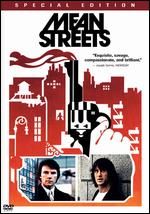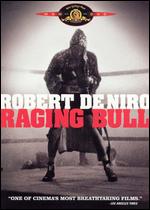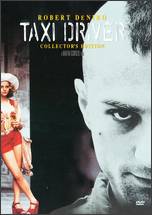The All-Time Mabee Top Ten: Favorite Martin Scorsese Films
 Mean Streets
Mean StreetsPN1997 .M4 2003
Mean Streets was not Martin Scorsese's first film, but it was the first one that really mattered, an alternately troubling and exhilarating look at one man's obsessions and at a subculture that other movies rarely examine beneath the surface. Scorsese's fascination with sin, redemption, guilt, and crime first bore real fruit in Mean Streets, and in many ways Charlie (Harvey Keitel) is the ultimate Scorsese character: a sincere Catholic who, as a low-level gangster, has chosen to live outside the laws of God and Man, and who tries to find a penance and personal moral code that will mean something to him. Charlie's inner turmoil underscores the film's every movement, as his loyalties are torn among the church, his boss Giovanni (Cesare Danova), his irresponsible best friend Johnny Boy (Robert DeNiro), and his epileptic girlfriend Teresa (Amy Robinson). Meanwhile, Scorsese and his camera revel in the details of Charlie's world, finding a dizzying excitement and strange beauty in the violence, drunkenness, and intrigue of life along the criminal margins. Charlie seems to have one foot in the present and the other in turn-of-the-century Sicily, and the soundtrack, which combines the rickety Italian folk melodies of the Feast of Gennaro with classic jukebox rock-and-roll (drawn from records in Scorsese's own collection, complete with scratches), plays this duality for all it's worth. Mean Streets is packed with superb performances (it made Keitel and DeNiro major names overnight, and deservedly so) and remarkable moments that stick in the memory long after the film is over: the drunken welcome home party, the fight in the pool hall, Johnny Boy's strange little dance while Charlie is trying to get him out of town. If Scorsese's first two films were about refining his ideas and learning his craft, Mean Streets was where he first put the pieces together properly, and the result was the first great work from one of the most important filmmakers of his generation. ~Mark Deming, All Movie Guide
Watch the trailer:
Raging Bull
PN1997 .R34 1991
Watch the trailer:
Raging Bull

PN1997 .R34 1991
Martin Scorsese's brutal character study incisively portrays the true rise and fall and redemption of middleweight boxer Jake La Motta, a violent man in and out of the ring who thrives on his ability (and desire) to take a beating. Opening with the spectacle of the over-the-hill La Motta (Robert De Niro) practicing his 1960s night-club act, the film flashes back to 1940s New York, when Jake's career is on the rise. Despite pressure from the local mobsters, Jake trusts his brother Joey (Joe Pesci) to help him make it to a title bout against Sugar Ray Robinson the honest way; the Mob, however, will not cave in. Jake gets the title bout, and blonde teenage second wife Vickie (Cathy Moriarity), but success does nothing to exorcise his demons, even as he channels his rage into boxing. Alienating Vickie and Joey, and disastrously gaining weight, Jake has destroyed his personal and professional lives by the 1950s. After he hits bottom, however, Jake emerges with a gleam of self-awareness, as he sits rehearsing Marlon Brando's On the Waterfront speech in his dressing room mirror: "I coulda been a contender, I coulda been somebody." Working with a script adapted by Mardik Martin and Paul Schrader from La Motta's memoirs, Scorsese and De Niro sought to make an uncompromising portrait of an unlikable man and his ruthless profession. Eschewing uplifting Rocky-like boxing movie conventions, their Jake is relentlessly cruel and self-destructive; the only peace he can make is with himself. Michael Chapman's stark black-and-white photography creates a documentary/tabloid realism; the production famously shut down so that De Niro could gain 50-plus pounds. Raging Bull opened in late 1980 to raves for its artistry and revulsion for its protagonist; despite eight Oscar nominations, it underperformed at the box office, as audiences increasingly turned away from "difficult" films in the late '70s and early '80s. The Academy concurred, passing over Scorsese's work for Best Director and Picture in favor of Robert Redford and Ordinary People, although De Niro won a much-deserved Oscar, as did the film's editor, Thelma Schoonmaker. Oscar or no Oscar, Raging Bull has often been cited as the best American film of the 1980s. ~Lucia Bozzola, All Movie Guide
Watch the trailer:
Or watch a clip from The Flintstones with dialogue from Raging Bull (contains profanity):
"I'm God's lonely man," says Travis Bickle, played by Robert De Niro in one of his finest and most memorable performances. Travis, the protagonist and focal point of Taxi Driver, is severely out of his element in New York City, though it's hard to imagine where else he would fit in; he goes through life as if the world speaks a dialect unknown to him. He seems incapable of relating to anyone beyond superficial pleasantries or casual violence, and when he does attempt to reach out to others — to beautiful campaign manager Betsy (Cybil Shepherd), to philosophical cabbie Wizard (Peter Boyle), or to teenage runaway-turned-prostitute Iris (Jodie Foster) — he runs into a brick wall despite his best intentions, as he can't fully comprehend others and they can't fathom him. Screenwriter Paul Schrader and director Martin Scorsese place this isolated, potentially volatile man in New York City, depicted as a grimly stylized hell on Earth, where noise, filth, directionless rage, and dirty sex (both morally and literally) surround him at all turns. When Travis attempts to transform himself into an avenging angel who will "wash some of the real scum off the street," his murder spree follows a terrible and inevitable logic: he is a bomb built to explode, like the proverbial gun which, when produced in the first act, must go off in the third. While De Niro's masterful performance brings Travis to vivid life, it's Scorsese's dynamic, idiosyncratic visual storytelling (given an invaluable assist by cinematographer Michael Chapman) that provides the perfect narrative context. Capturing New York's underbelly with a palate of reds and yellows that burn with an evil glow, Scorsese fills the story with tiny details and offhand moments that form the fully rounded reality of Travis' fallen world. If De Niro produced one of film's most troubling portraits of a lost soul, Scorsese created a painfully vivid purgatory for him to live in, and, alongside Raging Bull, Taxi Driver marks the finest work of this actor/director team. ~Mark Deming, All Movie Guide
Watch the Trailer:

0 Comments:
Post a Comment
<< Home